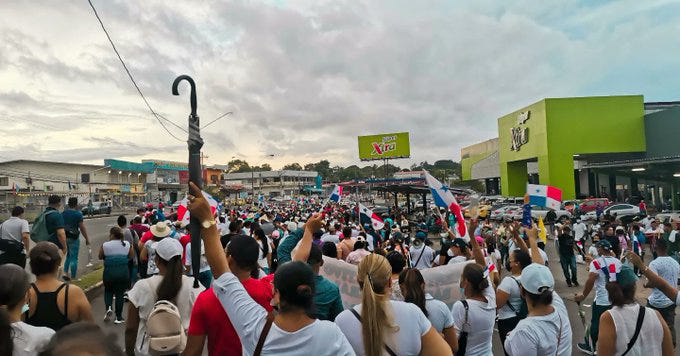Chiquita fires thousands in Panama in bid to crush ongoing labor strikes
Protests in the country over pensions changes have expanded to include demands for labor reform and criticisms of Trump
U.S. firm Chiquita has a checkered history in Latin America. On Thursday, it added to a long legacy of anti-labor actions in Latin America by firing more than 5,000 banana plantation workers as part of attempts to crush a nearly month-long strike that has encompassed multiple labor sectors in Panama.
Banana workers have been on strike since April 28 in the Caribbean province of Bocas del Toro, where they have blocked roads and mounted fierce protests over a Congressional law that enacts reforms on the country's national pension system.
Since April 23, union members and informal labor organizations, including construction workers, teachers, doctors, and indigenous communities, have organized nationwide protests against the reforms.
The protests have grown to include marches and demonstrations against a recent deal between President José Raúl Mulino and U.S. Secretary of Defense, Pete Hegseth, which allows the deployment of U.S. military personnel in areas near the Panama Canal.
Protests have spread in recent weeks as those on strike were joined by student organizations, urban activists, and workers at the Panamanian subsidiary of Chiquita Brands.


Panama’s labor court, however, declared the strike by Chiquita workers as “illegal”, following criticisms by President Mulino, who in recent days formed a commission to explore the possibility of declaring a state of emergency for Bocas del Toro to “restore order.”
Potesters have blocked major transportation corridors in the country, shutting down commerce. Police have also occasionally clashed with protesters, especially at blockades.
In a public statement on Friday, Chiquita wrote, “Unfortunately, following the unjustified abandonment of work at our plantations and operations centers since April 28 and continuing today, (Chiquita) has proceeded with the termination of all of our daily workers.” The statement claims the company has suffered losses of more than $75 million.
“Workers who find themselves in this situation must report to the Empalme Office starting 23 May, from 8:00 am to 4:00 pm, to withdraw their corresponding severance pay, in accordance with the law,” continued the Banana magnate.
Panama is one of the largest exporters of bananas in the world.
Chiquita has played a leading role in the banana industry for decades. In Panama alone, it has 26 farms covering some 7,000 hectares, representing 90% of the country's production in the provinces of Bocas del Toro and Chiriquí.
Chiquita has a long history of crushing labor movements in Latin America, most famously, the “Banana Massacre” in Magdalena, Colombia, in which armed men put down a strike of more than 25,000 plantation workers.
Historical accounts differ on how many were killed, with some sources claiming over a dozen, and others that more than 70 were shot by soldiers acting on behalf of the fruit company, at the time called United Fruit Company.
United Fruit changed its name to Chiquita in 1975, after a series of disastrous political interventions in Central and South America, including a bloody 1954 coup d'état in Guatemala.
Last year, Chiquita was convicted in U.S. courts of paying criminal paramilitary groups in Colombia for “protection” as part of their operations in the early 2000s.
Although the government has negotiated a package of benefits for the now-fired banana workers, union leader Francisco Smith said on Thursday they intend to maintain both the strike and road blockades until Congress approves changes to the controversial pension problem, or ratifies benefits for striking workers.
Police have arrested more than 200 demonstrators since the protests began, among them various union leaders. Saúl Méndez, the leader of one of Panama's largest unions, went into hiding in the Bolivian embassy after a warrant was issued for his arrest.
President Mulino in recent weeks has repeatedly attempted to curry favor with Chiquita, publicly imploring them not to close down their operations in Bocas del Toro.
Other unions, student groups, and indigenous movements have promised to continue.
Correction: Protesters have described pension reforms as “austerity measures”, but the government claims pension benefits will be increased for many participants. People who enter the program later in life will see reduced benefits, but most pensioners will see modest increases due to inflation adjustments, according to government claims.
This PWS feature originally presented protesters’ claims as a neutral fact. Those sections have since been corrected.
We are currently in a subscription drive! Please consider helping us bring you the independent journalism PWS has become known for! We have plans that start at just $5/month.
The Big Stories in LATAM
Venezuela arrested multiple opposition members on charges of “terrorism” ahead of parliamentary elections today.
The arrestees included Juan Pablo Guanipa, a close associate of opposition leader Maria Corina Machado. State television broadcast images of his arrest on Friday.
Venezuelan President Nicolas Maduro released a pre-written statement accusing Guanipa of human rights abuses, including stifling political dissent and false imprisonment.
Opposition members have called for voters to boycott elections.
El Salvador this week ramped up crackdowns on civil society this week after passing a new law targeting NGOs in the country. Human rights lawyer Ruth López was arrested in El Salvador after the Attorney General’s office accused her of embezzlement of state funds during her time in public office nearly a decade ago. López leads the anti-corruption investigations for human rights organization Cristosal.
The journalists, from Salvadoran media company El Faro, fled the country after they received tips from government sources that police were preparing to arrest them under “terrorism” laws that forbid speaking to, or writing about, organized crime in the country.
In the United States, President Donald Trump counted a victory as his budget bill passed the House of Representatives. The bill includes massive spending for border security and a huge payout to ICE. The bill is expected to pass the Senate as well, where Trump’s party holds a slim majority.
When it passes, ICE will become the most well-funded law enforcement organization in the country, and one of the most well-funded in the world.
Spanish Word of the Week
This week’s Spanish word of the week is actually dozens of words. We came across this fascinating piece on how much of Colombia’s slang was formed amidst a period of brutal violence, including the 53-year civil war.
Slang terms no longer in use, and many phrase that are, arose during a period of “rising peasant militias and constant atrocities. The language of violence became replete with euphemistic expressions like “guardian angel,” meaning your handgun, fosforear (from fosforo, match), meaning set the hillsides, farms or houses on fire, or to “turkey” or “pigeon” someone (pavear or palomiar), meaning to kill from the bushes. That was the work of the “birds,” the professional assassins of the time.”
From “gonorrhea” to “pelao”, many words still in use come from a bloody period in the country’s history. We highly recommend reading the piece, “Tamales To Gonorrhea: How Violence Shaped Colombian Spanish.”
Hasta pronto, piratas!





Thank you, Joshua. It would be very helpful if you could cite sources to support the claim that these reforms introduce "austerity into the pension system". Quite the contrary:
1. Before the reform, there were two completely independent subsystems:
a. Exclusively Defined Benefit Subsystem (SEBD in Spanish): This subsystem includes all current retirees and workers who were 35 or older in 2007 (roughly 50 years old today). It ran out of reserves last year to pay retirees. We had 20 years to prevent this outcome, but nothing was done beyond multiple dialogue roundtables.
b. Mixed Subsystem: This includes younger workers and new entrants to the labor market since 2007. There are no retirees in this subsystem. As of last year, it held over B/. 6 billion in reserves, part of which was allocated to individual accounts.
2. The reform merges both previous subsystems to finance pensions under the SEBD. Younger workers (formerly in the Mixed Subsystem with partial individual accounts) will now contribute to funding the pensions of current retirees. This new, consolidated reserve is called the Unified Solidarity Fund. It reintroduces the concept of intergenerational solidarity that was lost in the previous reform.
3. Retirement conditions remain unchanged for current retirees and those within seven years of retirement. No one’s retirement age is being raised.
4. Individual accounts are eliminated and replaced by notional accounts (inspired by the Swedish system), which serve only as a reference for pension calculation. Financially, the funds are pooled to pay current retirees; they are no longer individualized. This is because there were no longer sufficient funds to cover existing pensions, and the government lacked the resources to intervene.
5. Conditions do change for workers (for the better) from the Mixed Subsystem who now move into the Funded System with a Solidarity Guarantee (SCGS). Previously, the ILO estimated a replacement rate of no more than 35% under the Mixed Subsystem, since part of the contribution funded a limited pay-as-you-go component (capped at B/. 500) and the rest went to low-yield individual accounts (less than 2%).
6. Under the SCGS (new system), pensions are calculated like savings accounts: workers receive higher pensions if they contribute more (i.e., work more years) and start contributing early. A minimum return of 4% is guaranteed. In most cases, this results in higher replacement rates (pension as a % of average wage) than under the previous Mixed Subsystem. Only when workers start contributing very late (e.g., at age 35) do they receive lower pensions, due to reduced time for compound growth.
7. The reform increases non-contributory pensions from B/. 120 at age 65 to B/. 144 per month for older adults who did not contribute. For those who did contribute but whose calculated pension falls below B/. 265, the government will cover the difference — something that was not done previously. Both thresholds, B/. 144 and B/. 265, will be adjusted annually for inflation.
8. Under the reform, pensions in the new system will be indexed to inflation. This is a critical change, as pensions were previously not adjusted and lost purchasing power over time. The reform addresses this issue.
9. Not only is the retirement age not increased, but the reform’s financing comes from multiple sources: workers from the former Mixed Subsystem (intergenerational solidarity), private employers (who will face a 3-point increase in employer contributions by 2027, potentially amounting to at least B/. 500 million annually), and the government, which will transfer B/. 966 million each year to the Unified Solidarity Fund. This annual transfer must grow with GDP to sustain the reserve over the long term.
10. Regarding the investment of funds: 90% will continue to be managed by the Social Security Fund (CSS) through state-owned banks (BNP or Caja de Ahorros), and up to 10% may be managed by private entities. That said, most of the assets remain in state bank deposits (with low returns) and government-issued bonds or notes.
Sources:
- https://w3.css.gob.pa/wp-content/uploads/2020/12/INFORME-OIT.pdf
- https://www.mef.gob.pa/wp-content/uploads/2025/05/250428-Republic-of-Panama-CSS-Reform-Takeaways.pdf
- https://consultas.css.gob.pa/wp-content/uploads/2024/12/2024.12.02-Presentacio%CC%81n-Modelo-CSS-PL-164-de-2024.docx